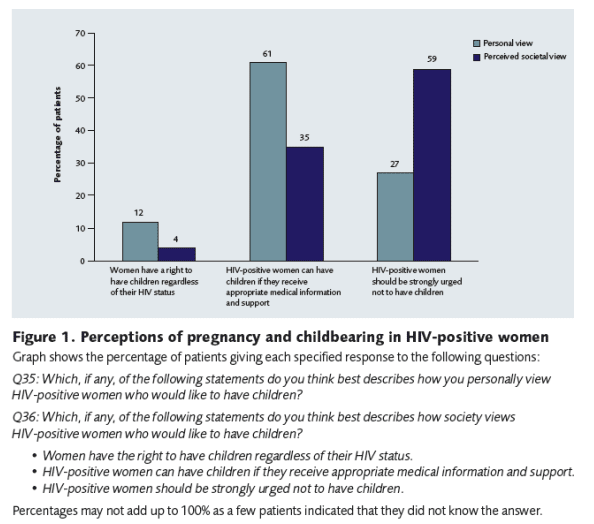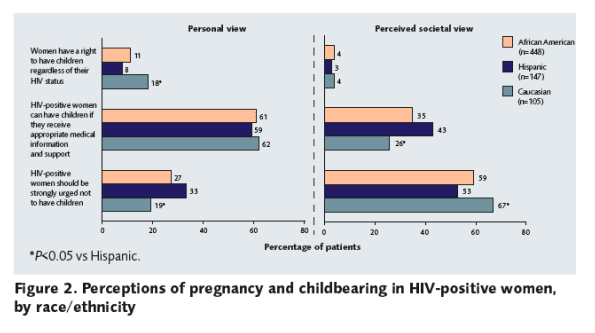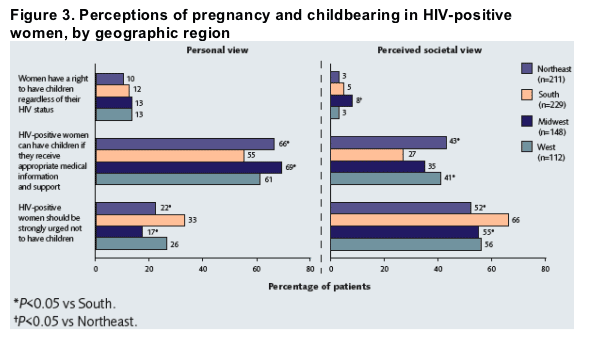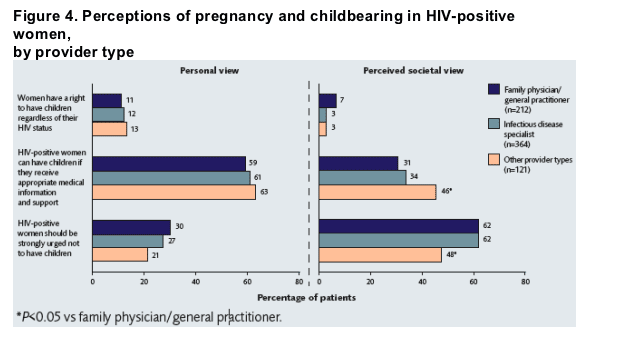 |
 |
 |
| |
Societal Stigma of Pregnant HIV-Infected Women in the United States
|
| |
| |
Reported by Jules Levin
IAC Mexico City Aug 3-8 2008
Kathleen Squires,1 Dawn Averitt Bridge,2 Judith Aberg,3 Judith Feinberg,4
Staats Abrams,5 Stephen P Storfer,6 Sally Hodder7
1Thomas Jefferson University, Philadelphia, PA; 2TheWell Project, Atlanta, GA; 3New York University, New York, NY; 4University
of Cincinnati, Cincinnati, OH; 5GfK Roper Public Affairs &Media, New York, NY; 6Boehringer IngelheimPharmaceuticals, Inc.,
Ridgefield, CT; 7University ofMedicine and Dentistry of New Jersey, Newark, NJ
AUTHOR CONCLUSIONS
This survey of HIV-positive women revealed a dichotomy between personal and perceived societal views on pregnancy and childbearing in HIV-positive women, with more than half of the participants experiencing societal pressure to forego childbearing.
These results highlight the need for up-to-date, factual education regarding pregnancy and childbearing in HIV-positive women among both the lay and medical communities.
INTRODUCTION
Over the past decade, significant advances in HIV care have been made to ensure safer impregnation, fetal development, and delivery of uninfected children in HIV-positive women.
Despite this, the social stigma surrounding pregnancy and childbearing in HIV-positive women remains strong.
HIV-infected women with dependent children are likely to feel stigmatized by society, particularly if they are the sole caregivers.1
Many of these women also feel that their children will be stigmatized if their mother's HIV status is disclosed.1
The fear of social stigma can negatively impact the course of HIV disease in HIV-positive women by preventing many from seeking early medical care.
The Women Living Positive survey was designed to explore the attitudes and behaviors of HIV-positive women in the United States, including their personal and perceived societal views on pregnancy and childbearing in HIV-positive women.
METHODS
The Women Living Positive survey was a telephone-based survey designed for HIV-positive women who had been receiving antiretroviral therapy for 3 or more years.
Flyers advertising the survey were placed at a national network of AIDS counseling centers in the United States, directing those interested in participating to call an 800 number.
The 15-minute telephone survey consisted of a series of eligibility questions plus 45 questions designed to effectively detail the patient's relationship with HIV health care providers, treatment priorities, and general pregnancy and HIV understanding, along with emotional aspects of living with HIV, including gender-specific questions about pregnancy and family planning issues.
The survey was conducted by GfK Roper Public Affairs, a public opinion polling firm, and funded by Boehringer Ingelheim Pharmaceuticals, Inc. TheWell Project, a nonprofit organization focusing on women and HIV, had input into survey questions.
Respondents were anonymously interviewed by telephone from December 21, 2006 through March 14, 2007; interviews were conducted in both English and Spanish.
Data were weighted by census regions and ethnicity/race to match the demographic profile of adult HIV-positive women in the United States.
Survey participants were compensated $25 for their time.
RESULTS
Patient demographics
A total of 700 HIV-positive women participated in the survey (42.9% African American, 28.6% Hispanic, and 28.6% Caucasian).
Of the participants, 16% were from the western United States, 21% were from the Midwest, 33% were from the South, and 30% were from the Northeast.
The mean age of the women was 42.5 years; 39% had children.
Participants had known about their HIV diagnosis for a mean of 10.6 years and were receiving antiretroviral therapy for a mean of 8.1 years.
Personal and perceived societal views on pregnancy and
childbearing
Figure 1 shows the participants' responses to 2 specific questions on their personal and perceived societal views on pregnancy and childbearing. Although 61% of the participants felt that HIV-positive women can have children if they receive the appropriate medical information and support, 59% believe that society strongly urges them not to have children.

Caucasian women were significantly more likely than Hispanic women to feel that society strongly urges them not to have children (67% vs 53%, P<0.05) (Figure 2).

Figure 3 shows the personal and perceived societal views on pregnancy and childbearing in HIV-positive women by geographic region. Study participants from the South were less likely than those from the Midwest or Northeast to personally feel that HIV-positive women can have children when provided the appropriate medical information and support; also, they were more likely to feel
that society believes HIV-positive women should be strongly urged not to have children.

Figure 4 portrays the personal and perceived societal views about pregnancy and childbearing by health care provider type. It reflects the opinions of participants who were under the care of different types of providers. Women who were under the care of an infectious disease specialist or a family physician/general practitioner were more likely to note societal stigma than those
treated by other types of providers (nurse practitioners, physician's assistants,
obstetricians/gynecologists, and physicians other than infectious disease specialists/family physicians/general practitioners).

REFERENCE
1.Marlink R, Kao H, Hsieh E. AIDS Res Hum Retroviruses 2001;17:1Ð33.
|
| |
|
 |
 |
|
|